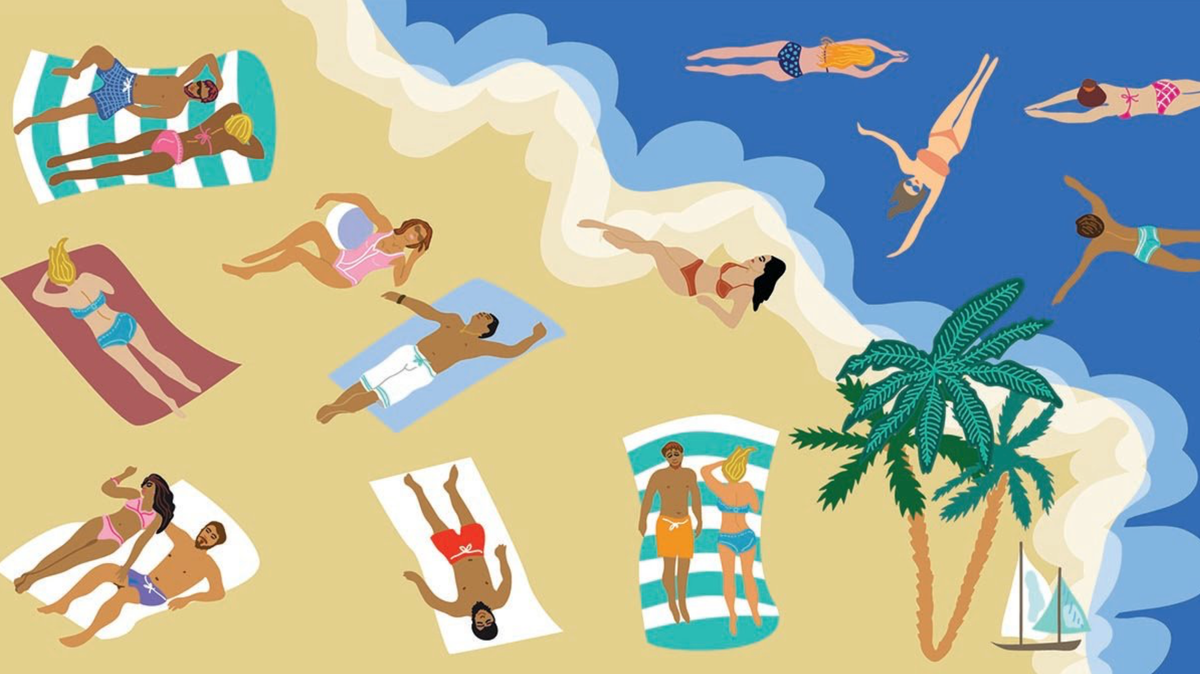Why do we feel so guilty about taking time off?

After a week eating my body weight in feta, and sunning my pasty body on a beach, I feel a bit more relaxed, a little less stressed (emphasis on the little here) and suddenly felt the urge to pick up hobbies I swiftly dumped once COVID came round.
Which swiftly lead me to the conclusion: I should just be on holiday more often. But then this imposing voice in my head came in and said, "you can't do that!" That was quickly followed by 439 emails that haven't been read in my absence, and an impending feeling of, "oh my god there's so much work to be done."
There's nothing revelatory about the effects of taking a holiday: you think less about work, you feel more relaxed, and if you're lucky, feel happier. Not to mention the mountain of evidence pointing to the benefits of taking time off.
But for so many of us, that drive to take a holiday, especially during lockdown has disappeared, or worse, been met with feelings of guilt.
I wanted to try and understand why we're less willing to take time off, and what that does to us, and the people around us.
Vacation Guilt 😭
Here's a fun place to start: according to a recent survey 83.3% of people in the UK will not take all of their allotted holidays in a year. On top of that, British Airways found that a third of UK workers were losing up to four days a year and that nearly three quarters (69%) were not taking a two-week holiday. This was before lockdown.
Completely un-scientific research conducted by myself has revealed this idea has got worse. Friends and colleagues, especially in the first four months of lockdown, took no time off at all. Prior to the global, pandemic, there was something called "Vacation Guilt", which has slipped easily into these pandemic themed times.
This is the idea that you feel you haven't earned the time off, and that taking time off is a fundamentally selfish act that hurts your fellow employees. And there's research to prove it. In Alamo Rent a Car’s 2019 Family Vacation Survey, 53% of workers say they feel guilty when taking time off because their coworkers are left to handle their job duties. But why?
Work martyr 👼
For many of us gripped with vacation guilt, there's a pervasive belief that time away from the office could potentially derail your career. According to research from software company, Kimble Applications, 14% of respondents believed that not using all of their vacation time increased their opportunities for advancement.
That likely explains why a whopping 56% of Americans still work while they’re on vacation. Interestingly, this workplace anxiety seems to affect people differently.
While Millenials - people born between 1981 and 1996 - were given the unflattering moniker of being lazier than their forefathers and foremothers, they're the most nervous about taking time off. Some 25% of respondents to a survey on holiday anxiety identified themselves as Millenial.
Whereas Gen Xers (born between 1965 - 1980) and baby boomers (1946-1964) felt fine about taking time off, with only 14% of Gen Xers and 6% of baby boomers feeling the pangs of guilt. Buy why?
I work therefore I am 🧑💼
Some researchers have suggested that younger people's identities are more tightly defined by where and what they do for work than generations previously, something that has been labelled "workism".
Workism is the belief that work is not only necessary to economic production but also the centrepiece of one’s identity and life’s purpose; and the belief that any policy to promote human welfare must always encourage more work.
The decline of traditional faith, the dismantling of communities, and breakdown in job security, and fluidity around what the future looks like,argues The Atlantic, coincides with an explosion of new atheisms.
"Some people worship beauty, some worship political identities, and others worship their children. But everybody worships something. And workism is among the most potent of the new religions competing for congregants."
It's an interesting idea: this subtle shift from jobs, to careers to callings. And it's probably why burnouts are a weird celebration of someone's dedication to work, especially in certain industries.
As several studies show, Millennials are meaning junkies at work. “Like all employees,” one Gallup survey concluded, “millennials care about their income. But for this generation, a job is about more than a paycheck, it’s about a purpose.”
Many of my friends work freelance and as such, the safety net that protects most people simply doesn't exist. Instead, being able-bodied and able-minded is the only route to a meaningful career, and thus, a well-formed self of self. A holiday doesn't really come into that thinking.
For generations where the workism mantra wasn't so severe, there is far less guilt surrounding holidays, and pursuits that take us far from our work.
So what's to be done? There are a lot of really good guides for how to take holidays off without the impending feelings of guilt which I'll link to below.
In the meantime, something I thought a lot about while on holiday was what work meant to me, and what I meant to my work. Does my work bathe me in a warm sense of personal fulfilment or does it feel more like, well, work? If the answer is the latter, maybe it's time for a break.
Ok, where can I learn more? 📚
- A psychologist teaches you how to take time off without feeling guilty.
- Work is the new God - should a job provide a pay check or a purpose? Great short video from The Atlantic.
- Kids These Days - a deep dive into why despite Millenials being the hardest working and most educated generation in history, they are poorer, more medicated, more precariously employed and have less of a social safety net thant their parents and grandparents.





